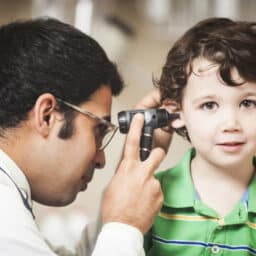What is Better Hearing and Speech Month?

May is Better Hearing and Speech Month, an annual campaign that aims to highlight the importance of communication and raise awareness about hearing, speech and language disorders. The American Speech-Language-Hearing Association (ASHA) has helped to lead and celebrate this month-long initiative since 1927. What’s the Goal? The theme for Better Hearing and Speech Month changes…
Technology May Put Kids & Teens at Risk for Hearing Loss

The Centers for Disease Control and Prevention reports, “An estimated 12.5% of children and adolescents aged 6–19 years (approximately 5.2 million) have suffered permanent damage to their hearing from excessive exposure to noise.” Arguably one of the main sources of this noise exposure is your child’s technological devices. In this post, we review how loud…
Is There a Link Between Hearing Loss and Genetics?

Genetics are responsible for many things, such as our height and eye color. Our genes can also play a part in determining our risk for various health conditions, including hearing loss. Genetics, Hearing Loss and Infancy Most newborns are tested for hearing loss shortly after their birth during universal hearing aid screenings. While newborn hearing…
How to Play Sports with Hearing Aids

If you use hearing aids to treat your hearing loss, you might wonder if it’s safe to play sports with them on. The good news is, not only is it safe, but it can actually improve your experience! The Importance of Staying Active Staying physically active is essential to your health. Current guidelines recommend that…
Here’s How You Can Make the Most of Video Games with Hearing Loss

According to the National Institute on Deafness and Other Communication Disorders, “One in eight people in the United States (13 percent, or 30 million) aged 12 years or older has hearing loss in both ears, based on standard hearing examinations.” If you’re among this population, you know that hearing loss can affect many aspects of…
What is a Directional Microphone?

Hearing loss makes it harder to both hear sounds as well as locate where they are coming from. Hearing aids with directional microphones can help! How Directional Microphones Make Hearing Aids Better As the name implies, directional microphones pick up sounds coming from specific directions. Some microphones are omnidirectional, which means that they collect every…
Ways To Prepare Your Toddler for a Hearing Test

Preparing your toddler for a hearing test may seem like a daunting endeavor. However, by preparing them ahead of time, you can make it an easier experience for everyone involved. How Common Is Pediatric Hearing Loss? While more common in older adults, hearing loss can happen at any age, including childhood. The Centers for Disease…
Are Your Child’s Headphones Too Loud?

Noise-induced hearing loss (NIHL) can be caused by a variety of activities, including listening to music through headphones too loudly. In fact, according to the National Institute on Deafness and Other Communication Disorders, “Long or repeated exposure to sounds at or above 85 dB can cause hearing loss. The louder the sound, the shorter the…
Music Lessons Can Benefit Children Who Are Deaf or Hard of Hearing

Music has always been a powerful tool for learning. After all, children first learn their ABCs by singing them. If your child has hearing loss, especially if it’s severe, you might assume that learning through music isn’t possible for them. On the contrary, children who use hearing aids and cochlear implants can use music to…
What You Should Know About Asymmetrical Hearing Loss

Asymmetrical hearing loss (AHL) refers to when your hearing loss is different in each ear. This condition is surprisingly common; according to one study, “Approximately 50% of all patients and 55% of patients with sensorineural hearing loss were classified as AHL by the clinician-validated algorithm.” Below we review everything you should know about asymmetrical hearing…